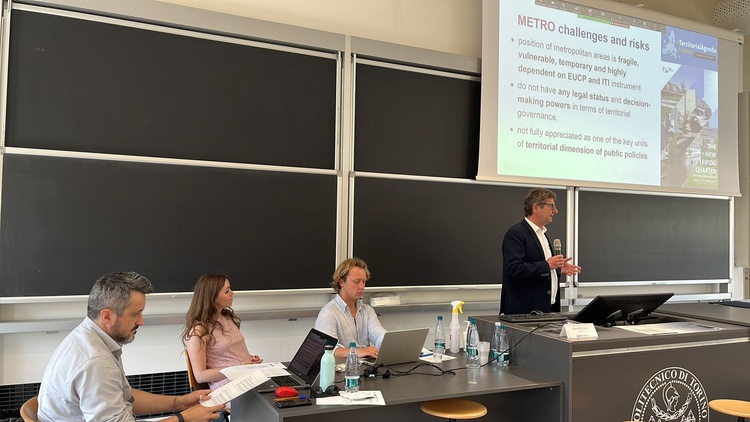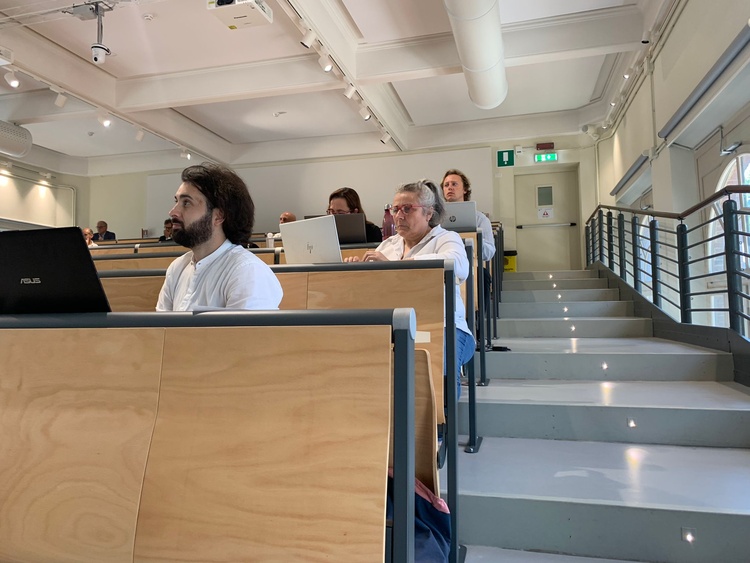At the end of the three-year project “ESPON METRO – The role and future perspectives of Cohesion Policy in the planning of Metropolitan Areas and Cities“, the main organiser of the project, the City of Turin and the Politecnico di Torino University, organised a final conference. The conference focused on the presentation of the results of research aimed at showing how policies implemented in metropolitan areas can make a decisive contribution to the specific objectives of Cohesion Policy. The aim of the conference was to present the conclusions of the project and to evaluate the recommendations of the research teams towards the metropolitan areas studied.
Nine European metropolitan areas and an equal number of research teams participated in the ESPON METRO project, analysing and comparing the role of Cohesion Policy in the metropolitan planning and implementation process. The individual research teams studied the experiences of the metropolitan areas and analysed its territorial impacts in order to make concrete recommendations on how to improve metropolitan planning and cooperation.

The event was held in a hybrid mode with the possibility of attending in person at the Castello del Valentino or online. The conference was attended by national and international speakers, academics and representatives of European institutions. Participants discussed the role of European metropolitan areas in Cohesion Policy. The results of the nine case studies were presented during the conference, as well as the overall final recommendations of the project. Giancarlo Cotella from the Politecnico di Torino, the principal researcher of the project, mentioned during his presentation that in particular there is an insufficient involvement and recognition of metropolitan areas in the institutional structure of Cohesion Policy. In addition to an overview of the results of the ESPON METRO project and the results of the peer-learning seminars held as part of the project’s outreach activities, the conference also presented proposals on the role that metropolitan cities can play in the new Cohesion Policy. The conference was also attended by Péter Takács from the European Commission, who presented the objectives and governance of the new programming period, with a focus on the role that European metropolitan areas can play in the Cohesion Policy 2021-2027. Wiktor Szydarowski from ESPON programme also spoke about the focus of the programme after 2022 in the light of the new spatial research priorities of the European agenda. Good practice examples from other cities and countries were then presented, e.g. Patrycja Artymowska presented the newly developed urban agenda at the Polish level and Peter Austin from Oslo presented the metropolitan area experience in metropolitan strategic planning.


The final conference represented the final culmination of three years of work by the research teams and metropolitan areas. The City of Brno, through the Department of ITI Management and Metropolitan Cooperation, actively participated in the research project by cooperating with the expert team from Charles University. During the conference, Luděk Sýkora (research team from Charles University) presented the main challenges of the Brno Metropolitan Area and three recommendations towards more effective metropolitan planning and cooperation. In particular, he mentioned the need to strengthen metropolitan governance in the form of a new legal framework and increasing the participation and responsibility of individual metropolitan actors. The representative of the Brno Metropolitan Area evaluated the work of the research team and outlined the use of the team’s analytical work and their recommendations for the future, for example through the TA ČR METROSPOL project.
The results of the project and recommendations for the Brno Metropolitan Area can be found here. Thanks to the ESPON METRO project we have also gained new information on the institutional functioning of metropolitan areas in Europe and we will use many of the findings and good practices in our own activities.
Register your e-mail address to receive regular updates from the Brno Metropolitan Area.